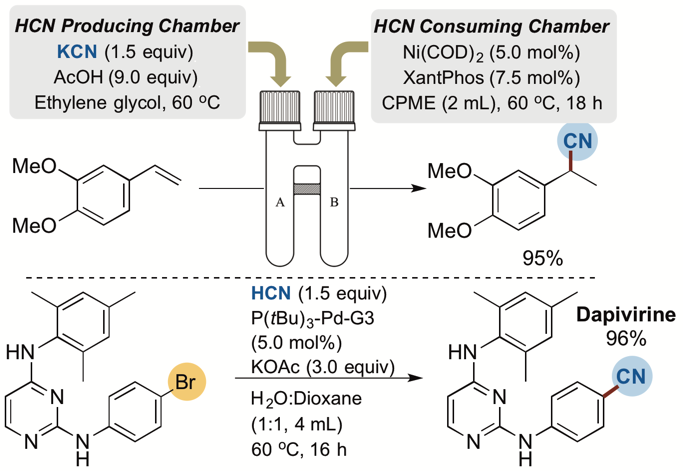Simple and safe method for using prussic acid as a precursor for valuable chemical compounds
Researchers from professor Troels Skrydstrup group publish new paper in Chemical Science describing a more safe and simple setting for performing chemical reactions with the highly toxic and explosive hydrogen cyanide

The class of compounds, benzonitriles are highly valuable within a broad range of applications serving as important substructures in many agrochemicals, pharmaceuticals, dyes, polymers and other organic materials. The nitrile group (C:::N) is also a precursor to a variety of important functionalities in organic molecules. However, there is a reluctance to applying hydrogen cyanide (HCN or prussic acid) in an academic setting or an R&D laboratory, which is undoubtedly linked to the high toxicity and explosive nature of this gaseous one-carbon reagent, thereby complicating its handling, storage and transportation
The work published by PhD Steffan K. Kristensen, Assoc. Prof. Anders Lindhardt and Prof. Troels Skrydstrup describes a simple setup whereby HCN is delivered in stoichiometric amounts by ex situ generation in a two-chamber reactor, thereby providing a safe setting for handling gaseous HCN in small-scale reactions, without the need for an HCN cylinder.
They demonstrate the usefulness of this setup not only for the Pd-catalysed cyanation of aryl bromides, but also for the Ni-mediated hydrocyanation of styrenes as a test reaction. With respect to the cyanation reactions, good functional group tolerance was obtained, and the method proved amenable to scale-up, but also to carbon-13 isotope labelling applying H13CN. The methodology was tested on the synthesis of three pharmaceuticals containing a benzonitrile subunit, including dapivirine, citalopram and letrozole, providing isolated yields from 86–97%.
This work is funded under the SPIR initiative by The Innovation Fund Denmark (http://biovalue.dk/), and Haldor Topsøe A/S.
For direct access to the paper: http://pubs.rsc.org/en/content/articlelanding/2017/sc/c7sc03912c#!divAbstract

